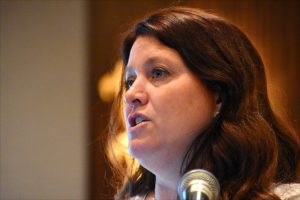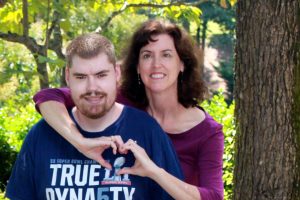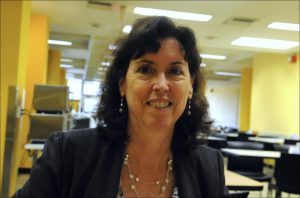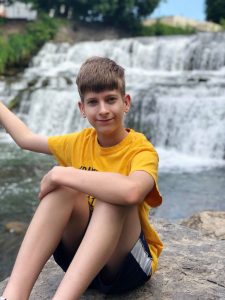Partners Launch Landmark Natural History Study of Prader-Willi Syndrome
Written by |
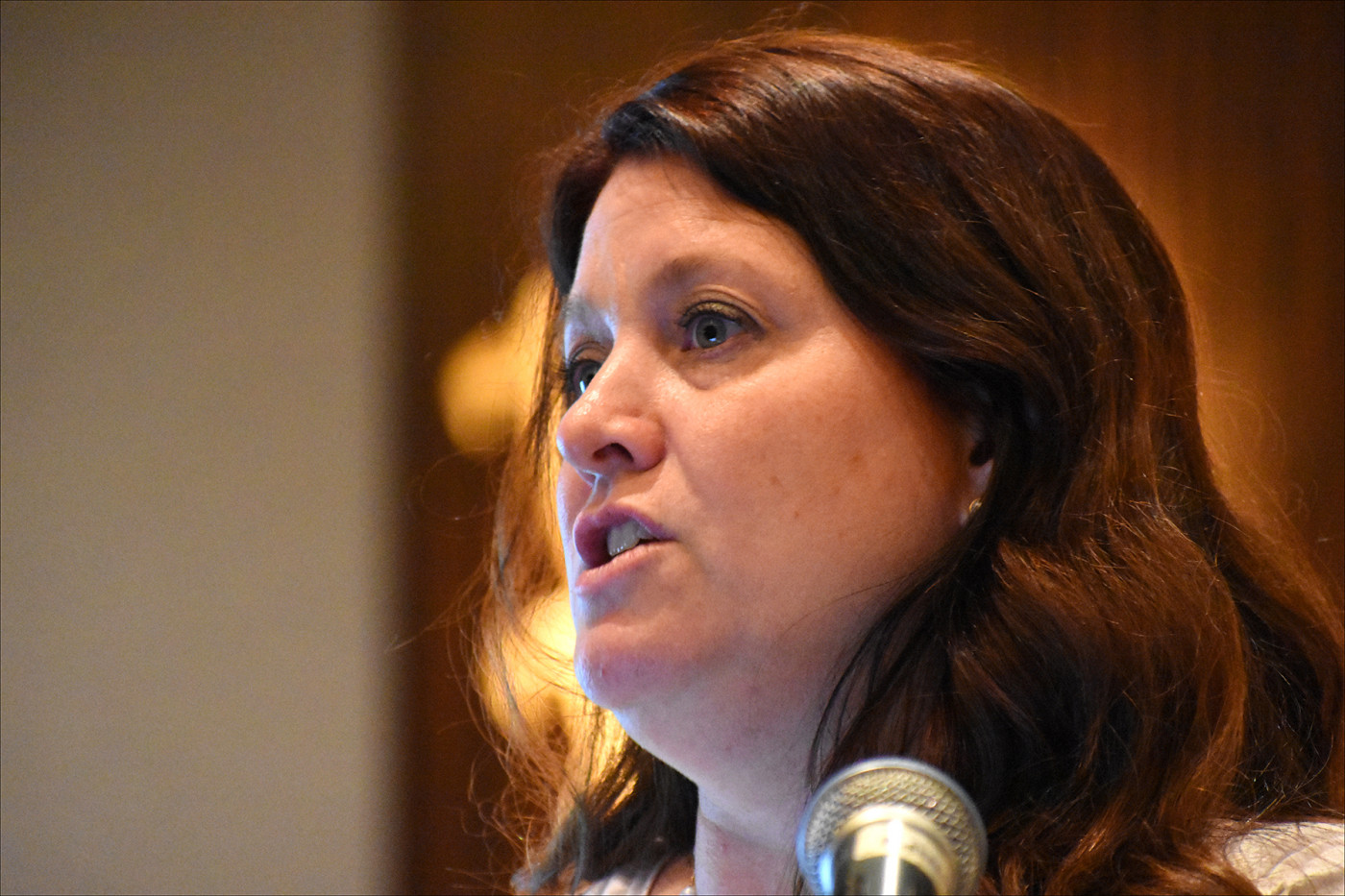
Lisa Matesevac, study coordinator for PATH, a natural history study of Prader-Willi syndrome, speaks during the NORD Patient & Family Forum in Houston. (Photo by Larry Luxner)
Two organizations that advocate for people with Prader-Willi syndrome have teamed up with Boston-based Zafgen to conduct an unprecedented natural history study of the rare neurodevelopmental disorder.
PATH for PWS is supported by both the Foundation for Prader-Willi Research (FPWR), headquartered in Walnut, California, and the Prader-Willi Syndrome Association (PWSA), based in Sarasota, Florida.
Lisa Matesevac, the study coordinator for FPWR, explained the importance of this new project during a recent event organized by the National Organization for Rare Disorders (NORD).
“It’s the largest natural history study of Prader-Willi syndrome ever done, focusing on serious medical events,” said Matesevac, speaking June 22 at the NORD Patient & Family Forum in Houston. “It’s going to help us better understand the type and frequency of these events.”
PATH stands for Paving the way for Advances in Treatments and Health for PWS. The four-year study was launched in October 2018; enrollment closed June 30, with 700 adults and children (age 5 and older) in the United States, Canada, Australia, and New Zealand participating.
The study aims to inform development and clinical trial design for potential new treatments, though no therapies will be provided as part of this study. In addition, PATH participants living in the U.S. will be asked to join an optional sub-study that involves providing a blood sample for analysis.
Study builds on Global PWS Registry
“Some individuals may be enrolled in clinical trials. However, the PATH study does not involve any treatment. Rather, it is collecting data about medical events that occur over a four-year period,” Matesevac told Prader-Willi Syndrome News. “If participants are enrolled in clinical trials, they will be asked to provide that information, but not the name of the specific trial.”
She added: “Zafgen is sponsoring the PATH study, so it is important that they remain blinded to information regarding the effects of drug treatments from other companies.”
Clinic visits are not required, though participants will be expected to report any type of serious medical event. These include required hospitalizations, emergency-room visits, any life-threatening event, or anything medically significant, such as blood clots, pneumonia, major infections, psychosis, significant self-injury, extreme aggression, suicidal thoughts, seizures, severe edema, or extreme food consumption in a short amount of time.
PATH for PWS involves three study investigators: lead investigator Theresa Strong, PhD, of FPWR; Shawn McCandless, MD, of Children’s Hospital Colorado in Aurora; and Jennifer Miller, MD, of the University of Florida in Gainesville. It builds on the power of the Global PWS Registry to advance clinical trials.
That registry, founded in 2015, “has become a critical source of support for clinical trials on Prader-Willi syndrome,” said Matesevac. It now includes 1,975 families worldwide, with most of them living in the United States; its 45 surveys cover the full spectrum of the disorder.
“It keeps a running record of your child’s developmental history. We can’t always remember everything, so it’s a good place to store all the data. Through those surveys, we are able to collect lots of information,” she said, adding that “social media is not really a great way to document your own experiences or what is truly effective.”
As the sponsor of PATH for PWS, Zafgen will send every family that completes the 14 initial surveys a $100 Amazon gift card. Families will receive additional $50 gift cards upon updating the survey every six months.
Zafgen’s investigative therapy, ZGN-1258, is designed to change the way the body metabolizes fat, while reducing fat mass and decreasing excessive hunger.
“While we understand more about Prader-Willi syndrome than ever before, it is critical that we continue to build on the body of knowledge to improve care and explore new treatment options,” said Strong, who also has a son with the disease. “Study participation contributes to the actionable information available to our community.”
Feeling hungry all the time
PWS, with an incidence of roughly 1 in 15,000 births, is characterized by hypotonia (low muscle tone), obesity, mild to moderate intellectual disability, and behavioral problems with a high risk of mental illness.
Patients frequently develop hyperphagia, or unrelenting hunger, no matter how much they eat.
This autumn, three important events associated with the disease will take place. The first is the FPWR’s 2019 Research Symposium & Family Conference, set for Oct. 3-5 in New Orleans; then the PWSA’s annual convention Oct. 24-25 in Orlando, Florida; and finally the 10th International Prader-Willi Syndrome Organization Conference, to take place Nov. 13-17 in Havana.
Matesevac, a pediatric audiologist, left her job at Pediatric ENT of Atlanta to become PATH’s study coordinator in October.
Her son Evan, 12, was diagnosed with PWS three weeks after birth, “but it’s not uncommon for families to get a diagnosis only when the hyperphagia and related obesity occurs. Anywhere between ages 2 and 6, children will experience this transition to a state of hyperphagia and can gain weight — even with the same caloric intake.”
She added: “While people may have a diagnosis, unless they seek the support of an organization, they go uncounted. Based on the reporting I’ve seen, only 50% of the expected number of people with Prader-Willi are connected with support organizations.”
1,400 calories a day
Fortunately for Matesevac, her son is 5-foot-1 but weighs only 80 pounds — so unlike many Prader-Willi kids, he’s underweight. But that’s only because his parents work tirelessly to maintain a strict exercise and diet regimen for Evan, who is allergic to eggs, milk, and nuts.
“We work closely with various endocrinologists and Prader-Willi specialists to come up with a diet we feel meets his needs for growth and development. If his weight is not controlled, obesity can occur at any time,” she said. “My son did a metabolic study at UF, so we were able to determine how many calories were necessary for him to maintain growth and a healthy weight.”
In Evan’s case, that number is 1,400 calories a day.
“I don’t restrict what we put on his plate. We just give him healthy proteins, fresh fruits and vegetables, and recently introduced some more carbs at the request of his endocrinologist. But that’s because he’s going through puberty at age 12 and she felt it would be necessary.”
Matesevac said Evan is “very aware of his syndrome and tells us” when situations make him anxious or nervous.
“He has some temper outbursts, and can be very rigid and inflexible at times. If he perceives that somebody is upset with him, he has a strong emotional response to that,” she said. “So it’s important in our day-to-day lives to remain very neutral at all times. There’s a lot of pre-planning that goes into what we do. For example, if we know we’re going to a party, we take two cars, so if he’s upset about a food buffet, one of us can take him home.”
She added: “It doesn’t matter if he has an intellectual understanding of his syndrome. His body tells him that he’s starving. So if I feed him a meal and ask if he’s full, the answer will never be yes.”



